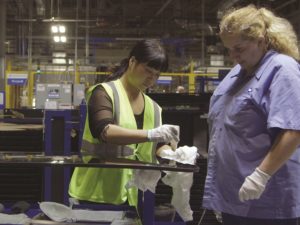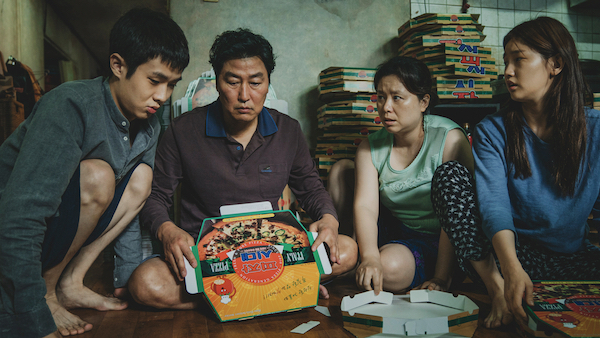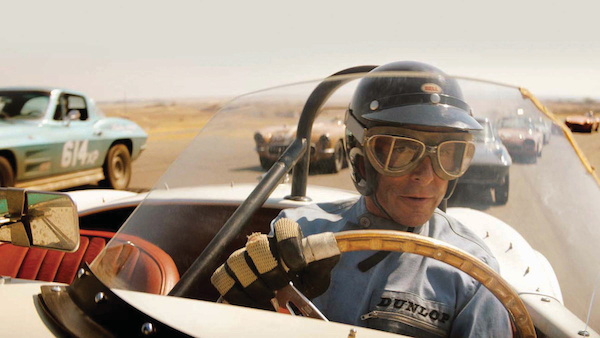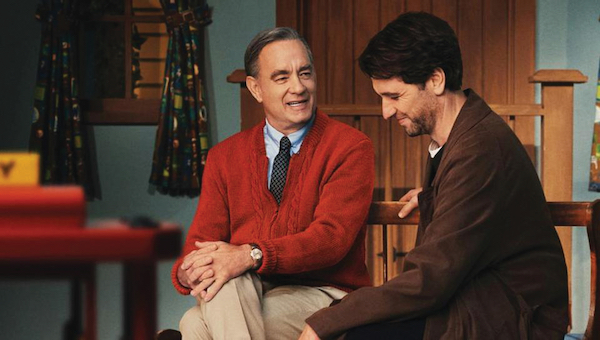We live in an era in which adolescent fantasies of masculinity are being lived out in a grotesque and outsized way. Even more than Bush fils, Donald Trump seems caught up in an Oedipal loop, incapable of absorbing the realities of adult sexual roles, identity, respect, and tolerance. It’s not surprising that such destructive caricatures exist in the political sphere, but it is shocking that 40 percent or more of the people in this most powerful nation on Earth, if polls can be believed, actually approve and support them.
Two filmmakers have recently presented their visions of man-children in the promised land: Judd Apatow, a Hollywood maverick who likes to test the limits of romantic comedy (The 40-Year-Old Virgin; Knocked Up; Trainwreck), and Kelly Reichardt, a rigorous independent who strips cinematic narrative down to its core essentials (Old Joy; Wendy and Lucy; Meek’s Cutoff). Although Apatow deals with the current fragile state of the straight white male ego, his films have the reassuring moral compass of classic storytelling. Conversely, Reichardt may view the wild Northwest of the Gold Rush era — and its rigid and rudimentary sense of law and justice —as a kind of all-male biblical setting, but her movie presents a platonic male couple in a radically gentle and uncompetitive way. Each film would have been better watched on a big screen. But with the Covid-19 pandemic still upon us, and movie theaters trying vainly to open up for safe viewing, streaming at home is the only choice we have.
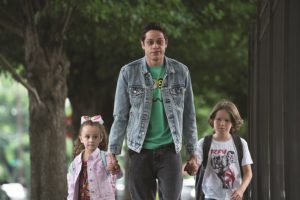
The King of Staten Island, Pete Davidson’s largely autobiographical story of growing up impaired in the blue-collar wasteland of the titular borough of New York City, never actually opened in theaters. It had a selective streaming release in June, then was held for a wider release on various services and on disk in late August.
Davidson, an emerging standup comic who became a regular on Saturday Night Live, lost his fireman father to 9/11. He grew up medicated for mental illness, which still afflicts him, and has gone through gossip-frenzied public affairs with Ariana Grande and Kate Beckinsale. In the movie, he plays 24-year-old Scott Carlin, who likewise lost his fireman father at an early age and lives at home with his mother, struggling with depression and an aimless existence. Davidson co-wrote the script with Apatow and Dave Sirus, and Apatow directed.
The movie is fleshed out with a lot of charm and a talented cast, notably Marisa Tomei as Scott’s mom, Bel Powley as the girlfriend he can’t commit to, and standup Bill Burr as a fireman who knew his dad and starts to date his mom. Small roles are filled by such character greats as Steve Buscemi and Kevin Corrigan, who give a fairly conventional coming-of-age and coming-to-terms tale a bit of depth and class.
From the moment the movie begins, with a tense, near-suicidal episode featuring Scott driving on a highway, it keeps the viewer distracted from its inevitable resolution with smart-ass humor and thwarted emotions. Apatow, at times, seems more interested in the arc of Tomei’s mom than that of Davidson’s tormented naïf. He also gives Powley, who played the awkwardly sexual lead of The Diary of a Teenage Girl, some poignant moments. Burr, as the errant boyfriend who teaches Davidson how to be a man, shows genuine acting chops. Overall, Apatow’s light and sensitive approach to male bonding gives the movie a buoyant feel, despite the surfeit of tattoos, drugs, pranks, and petty crime. It’s the antidote to Trumpian posturing.
One of the most startling and revealing moments of Reichardt’s First Cow, which is about pioneer loners in the Oregon Territory of the late 1800s, happens during the film’s opening — in the present. A young woman notices something odd in the forest and digs up a grave with two skeletons, side by side. Reichardt then seamlessly cuts 150 years into the past, and we see the story of those two skeletons come to life.
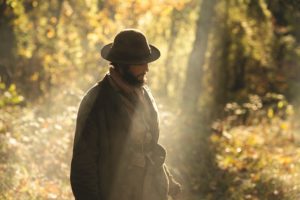
The movie, which is shot in a fairly square, un-widescreen format in deeply saturated greens, is a beautiful example of Reichardt’s minimalist style, particularly in its shots and setups that stay fixed longer than expected, limiting the subliminal cues that propel a narrative forward. The story is utterly simple: an East Coast baker (John Magaro) and Chinese immigrant (Orion Lee) meet up in the Oregon wilderness and form a friendship. They steal milk from the first cow imported to the area and sell the biscuits they make with it. Though it’s certain that their scam will end up being discovered, the leisurely way this plays out bares curious moments of truth.
Most interesting of all: sex is nearly absent, and the relationship between the two leads is intimate yet distant, without bickering or explicit affection. These quiet antiheroes are neither buddies nor lovers. They simply work together, plan together, survive together. You may wonder how they end up in their graves, but the movie never offers a climactic scene to explain it. In an oddly neutered way, it turns manhood into humanity.
First Cow was released on streaming channels in August and will be out on disk on Sept. 8.

